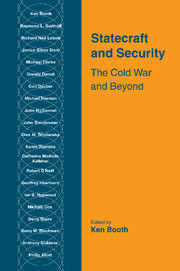Book contents
- Frontmatter
- Contents
- List of contributors
- Preface
- Introduction
- Part one Cold War: lessons and legacies
- Part two Post-Cold War: powers and policies
- 5 Can the United States lead the world?
- 6 Can Russia escape its past?
- 7 Imperialism, dependency and autocolonialism in the Eurasian space
- 8 Western Europe: challenges of the post-Cold War era
- 9 Europe and the wider world: the security challenge
- 10 A new Japan? A new history?
- 11 New China: new Cold War?
- 12 Africa: crisis and challenge
- 13 Of medium powers and middling roles
- Part three Beyond: resistances and reinventions
- Conclusion: security within global transformation?
- Index
12 - Africa: crisis and challenge
Published online by Cambridge University Press: 06 October 2009
- Frontmatter
- Contents
- List of contributors
- Preface
- Introduction
- Part one Cold War: lessons and legacies
- Part two Post-Cold War: powers and policies
- 5 Can the United States lead the world?
- 6 Can Russia escape its past?
- 7 Imperialism, dependency and autocolonialism in the Eurasian space
- 8 Western Europe: challenges of the post-Cold War era
- 9 Europe and the wider world: the security challenge
- 10 A new Japan? A new history?
- 11 New China: new Cold War?
- 12 Africa: crisis and challenge
- 13 Of medium powers and middling roles
- Part three Beyond: resistances and reinventions
- Conclusion: security within global transformation?
- Index
Summary
When Africa is discussed today one often hears reference to ‘Afropessimism’, ‘collapsed states’, the ‘coming anarchy’ (Kaplan, 1994; Zartman, 1995). Bloody chaos in Somalia and Liberia, and ethnic slaughter in Rwanda have given powerful justification for this apocalyptic vision of Africa's future. Events elsewhere inspire hope. The ending of apartheid in South Africa and the transition to a democratic non-radical political system were something of a miracle, a reminder that sometimes great men do indeed shape the course of history. Decades-old conflicts have also ended in Eritrea, Mozambique and perhaps Angola. Potentially of even greater significance is the move towards political liberalisation, reflecting the continent-wide aspiration for more accountable and democratic systems of government. Which vision gives a better clue to the future? This chapter reviews the economic and political reforms that are the current international prescription for Africa's crisis. It concludes that the weak initial conditions, acute internal constraints and unfavourable external environment make for a difficult medium-term scenario. Broader long-term strategies are required, more firmly anchored in jointly agreed international commitments, and better integrated into nationally designed policies that build on the capacities of African communities and take more account of Africa's cultures, values and knowledge systems. Unless otherwise stated, the terms African and Africa refer to sub-Saharan Africa.
Africa marginalised
With the ending of the Cold War, strategic and geopolitical considerations no longer compel the major powers to support ‘their’ African strongmen against perceived threats from the ‘other side’.
- Type
- Chapter
- Information
- Statecraft and SecurityThe Cold War and Beyond, pp. 247 - 269Publisher: Cambridge University PressPrint publication year: 1998

